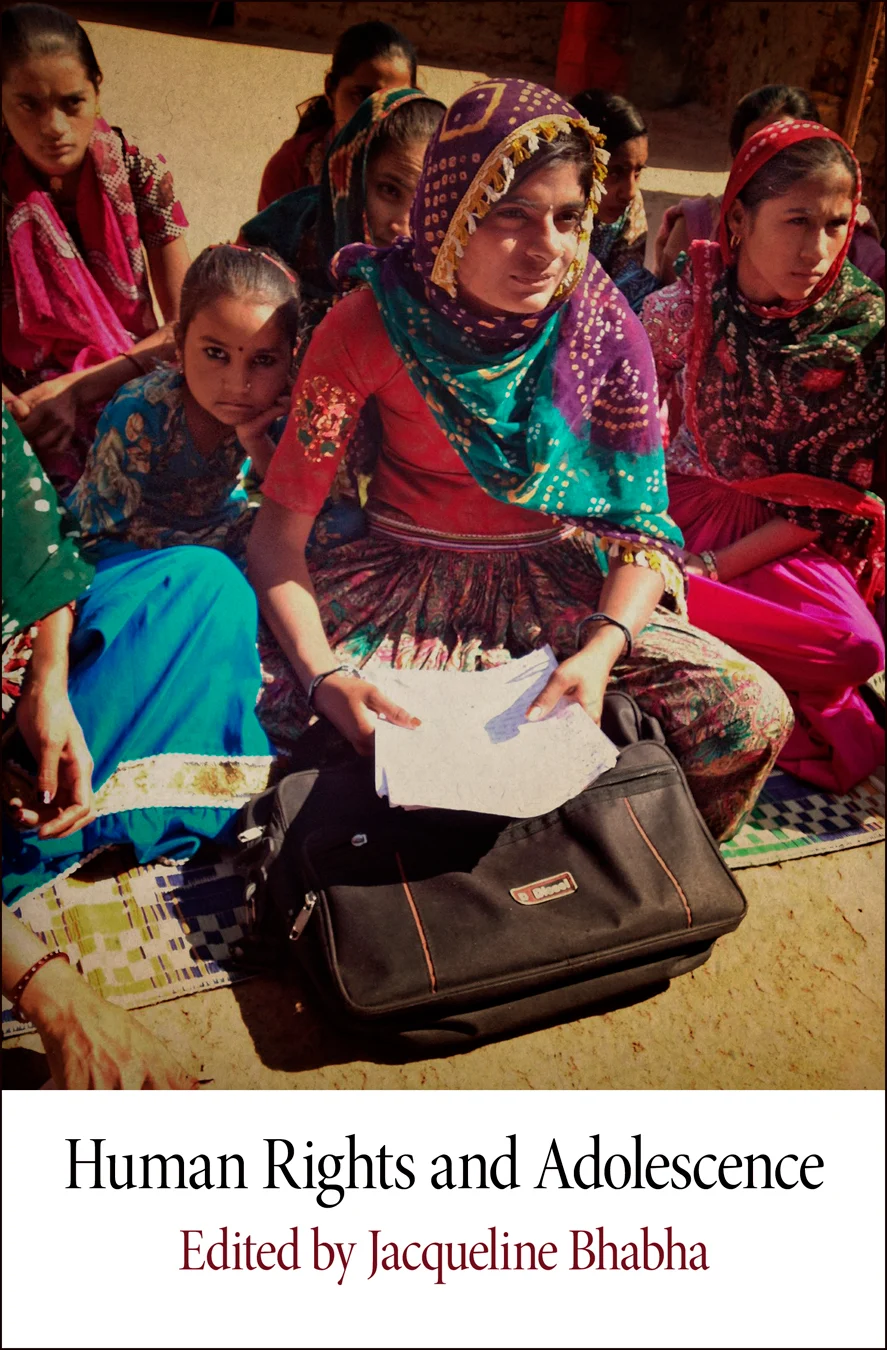Human Rights and Adolescence – Jacqueline Bhabha (Ed.)

Author: Jacqueline Bhabha
Publisher: University of Pennsylvania Press
Year of Publication: 2014
Print Length: 376 pages
Genre: Non-Fiction / Cultural Studies, Non-Fiction / Development Studies, Non-Fiction / Economics, Non-Fiction / Social Science, Non-Fiction / Sociology
People: The Arabs
Topic: Crimes, Development, Disability, Emotions & Feelings, Human Rights, India, International Law, Policy & Practice, Poverty, Resilience, Social Reconstruction, Trauma, Universalism, War, Youth & Youthhood
While young children’s rights have received considerable attention and have accordingly advanced over the past two decades, the rights of adolescents have been neglected. This manifests itself in pervasive gender-based violence, widespread youth disaffection and unemployment, concerning levels of self-abuse, violence and antisocial engagement, and serious mental and physical health deficits. The cost of inaction on these issues is likely to be dramatic in terms of human suffering, lost social and economic opportunities, and threats to global peace and security. Across the range of disciplines that make up contemporary human rights, from law and social advocacy to global health, history, economics, sociology, politics, and psychology, it is time, the contributors of this volume contend, for adolescent rights to occupy a coherent place of their own.
Human Rights and Adolescence presents a multifaceted inquiry into the global circumstances of adolescents, focusing on the human rights challenges and socioeconomic obstacles young adults face. Contributors use new research to advance feasible solutions and timely recommendations for a wide range of issues spanning all continents, from relevant international legal norms to neuropsychological adolescent brain development, gender discrimination in Indian education to Colombian child soldier recruitment, stigmatization of Roma youth in Europe to economic disempowerment of Middle Eastern and South African adolescents. Taken together, the research emphasizes the importance of dedicated attention to adolescence as a distinctive and critical phase of development between childhood and adulthood and outlines the task of building on the potential of adolescents while providing support for the challenges they experience.
Table of Contents
Introduction. The Importance of a Rights- Based Approach to Adolescence – Jacqueline Bhabha
PART I. UNDERSTANDING ADOLESCENCE: DISCIPLINARY PERSPECTIVES
1. Protecting and Promoting Adolescent Rights: The Contribution of International Law and Policy – Jean Zermatten
2. Transitions to Adulthood in Contemporary Italy: Balancing Sociocultural Differences and Universal Rights – Elena Rozzi
3. Th e Science of Adolescent Brain Development and Its Implications for Adolescent Rights and Responsibilities – Laurence Steinberg
4. Building Capability and Functioning: Reframing the Rights Agenda for Adolescents Through the Lens of Disability Rights – Victor Pineda
5. Adolescent Social and Emotional Development: A Developmental Science Perspective on Adolescent Human Rights – Clea McNeely and Krishna Bose
PART II. GROWING UP WITH VIOLENCE: ADOLESCENT TRAUMA,
STIGMA, AND RESILIENCE
6. Poverty, Armed Conflict, and Organized Crime: The Impact of Violence on Young People in Colombia – Christian Salazar Volkmann
7. Coming of Age in the Context of War: Reframing the Approach to Adolescent Rights – Theresa S. Betancourt, Katrina Hann, and Moses Zombo
8. Wings of the Phoenix: The Legacy of Violence for Adolescents in Postconflict Reconstruction – Elizabeth Gibbons
9. Adolescents in the Colombian Armed Conflict: Recruitment Realities and Important Lessons for Their Successful Reintegration – Katie Naeve
PART III. SOCIAL INTERVENTIONS: STRATEGIC APPROACHES TO ADOLESCENT RIGHTS
10. Young Arabs and Evolving Realities: Linking Social and Economic Rights – Jocelyn DeJong and Mary Kawar
11. The Challenges Facing India in Advancing Secondary Education Attainment Among Adolescent Girls – Orla Kelly and Elizabeth A. Newnham
12. Rights and Realities for Vulnerable Youth in Urban Brazil: Challenges in the Transition to Adulthood – Irene Rizzini and Malcolm Bush
13. Youth Unemployment: Facing and Overcoming Obstacles in Partnership – Glaudine Mtshali
14. Confined by Narrow Choices: The Stories of Roma Adolescents – Margareta Matache and David Mark
15. Beginning in the Middle: Ending the Exploitation of Adolescents in India – Shantha Sinha
16. Indian Adolescence and Its Discontents: Transformational
Solutions Th rough Education, Skill Development, and Employment – Neera Burra
17. Emerging from the Shadows: Adolescents with Disabilities
Claim Th eir Rights Under International Law – Kerry Thompson
List of Contributors
Index
Acknowledgments

Jacqueline Bhabha is FXB Director of Research, Professor of the Practice of Health and Human Rights at the Harvard School of Public Health, the Jeremiah Smith Jr. Lecturer in Law at Harvard Law School, and an Adjunct Lecturer in Public Policy at the Harvard Kennedy School. She received a first class honors degree and an M.Sc. from Oxford University, and a J.D. from the College of Law in London. From 1997 to 2001 Bhabha directed the Human Rights Program at the University of Chicago. Prior to 1997, she was a practicing human rights lawyer in London and at the European Court of Human Rights in Strasbourg. She has published extensively on issues of transnational child migration, refugee protection, children’s rights and citizenship. She is the editor of Children Without A State (2011), author of Child Migration and Human Rights in a Global Age (2014), and editor of Human Rights and Adolescence ( 2014). Bhabha serves on the board of the Scholars at Risk Network, the World Peace Foundation and the Journal of Refugee Studies. She is also a founder of the Alba Collective, an international women’s NGO currently working with rural women and girls in developing countries to enhance financial security and youth rights.
Source: https://www.hsph.harvard.edu/profile/jacqueline-bhabha/
More from Jacqueline Bhabha in this library, click here.
